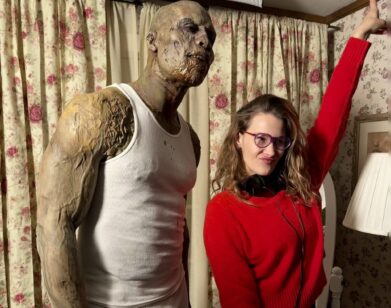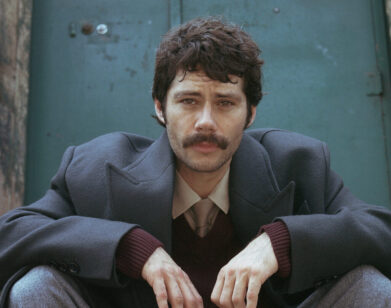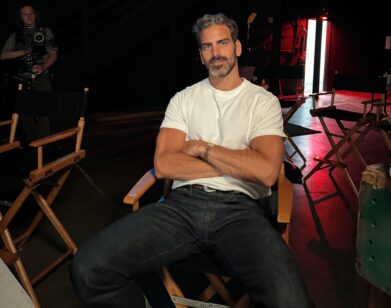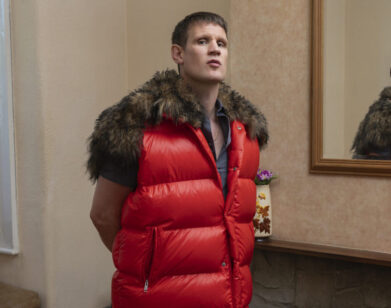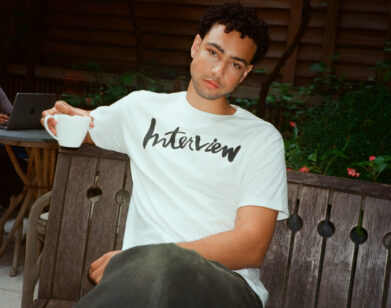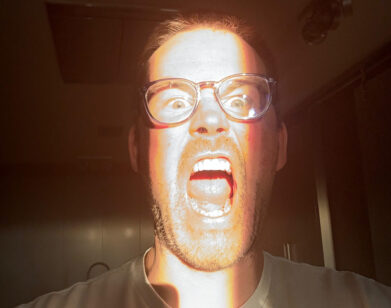Freda Kelly: Here, There and Everywhere with the Beatles
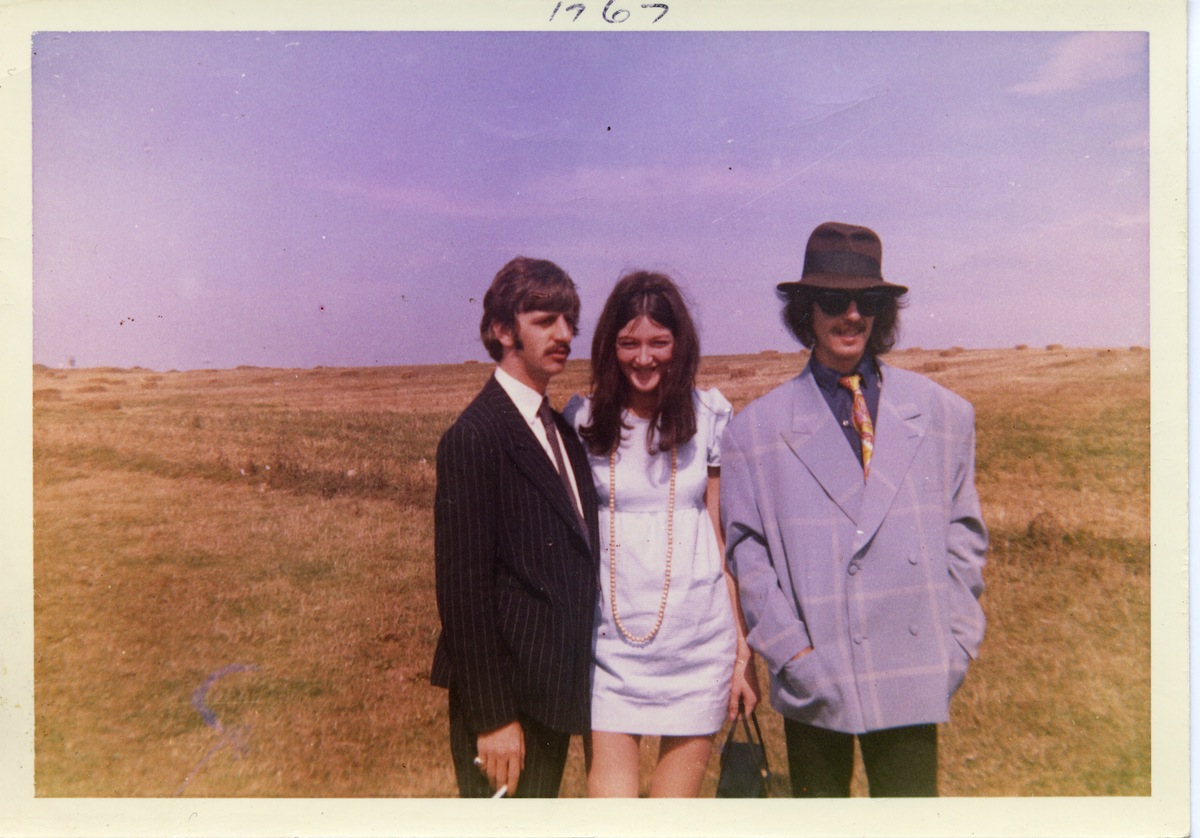
ABOVE: FREDA KELLY WITH RINGO STARR (LEFT) AND GEORGE HARRISON. IMAGE COURTESY OF FREDA KELLY AND MAGNOLIA PICTURES
When Freda Kelly shakes your hand, she grabs your knuckles, daintily. Normally, you’d think it was a weak handshake, but with Kelly, it comes across as polite, charming, and self-possessed. It’s just these qualities, with a dash of loyalty and morality, that endeared her to The Beatles and their manager, Brian Epstein, over 50 years ago, when she was asked to be their secretary.
It was a job that she had, beginning when she was 16 and a half years old, for 11 years. (Even though history says The Beatles were only together for 10 years, she still worked for them for 11.) If you’re wondering why you’ve never heard of her until now, you’re not alone. And there’s a reason.
In this fame-obsessed Kardashian clime, it’s become increasingly more common for people to be famous by association, and parlay that “fame” into empires of reality televisions shows, book deals, and clothing lines. Someone as close to the most famous band of all time as Kelly was could easily have done just that. But Kelly, after spending 11 years as a close friend and honorary part of the pop music icons’ families, quietly slipped away from the limelight.
She’s only now broken her silence and anonymity because she wants to pass her memories down to her three-year-old grandson. Good Ol’ Freda, the nickname The Beatles gave her, is a documentary created by Ryan White, an award-winning Sundance Fellow. It’s the first independent film to have successfully licensed original Beatles recordings, and it won an audience choice award for best film at the Cleveland International Film Festival.
In honor of the documentary’s release, we sat down with Freda and Ryan to talk about how the coworkers Freda’s worked with for half of her life had no idea about her past with The Beatles, how she used to send the guys’ empty cigarette packs to fan club members—even White had never even heard that before—and cattle. (Just wait.)
CASSIE TITLE: I’ve read that you guys are family friends, but can you explain how you met and why, after 50 years of staying quiet, Freda chose to tell her story with this project?
RYAN WHITE: My uncle is actually in the film; his name is Billy Kinsley. He was in the Merseybeats. So I’ve grown up around that generation of people that came out of the Liverpool 1960s music scene. My aunt worked for Freda in the Beatles Fan Club. So I’ve known Freda since I was growing up, from various family events. But I did not know she was the Beatles’ secretary; she really is that private. So I found out a few years ago when she approached me about making the film, and she can probably speak better to why she approached me.
FREDA KELLY: Over the years I’ve had quite a few offers to do things; books and things like that, and I didn’t really want to do it. And then when my grandson came around I decided: well, yeah, I’ll either do it now or never. But I wanted to go with somebody that I knew and trusted; I didn’t want to just do it with complete strangers, because I’m a bit cagey like that. [laughs] I knew Ryan’s aunt, and she said: well, you’ll have a chat with Ryan, see if he can fit it in between filmings. And that’s how it came about.
TITLE: Your last film was about seeing the world through the lens of pick-up soccer. Are you just drawn to different projects?
WHITE: I think if there was a Venn diagram of the overlap between my first film and Good Ol’ Freda—my first film’s about pick-up soccer, street soccer. Our tagline was, “Far away from the bright lights and manicured fields, there’s another side of soccer.” And I actually think Good Ol’ Freda was very similar in that way of telling stories about people who are on the margins, who aren’t seeking the spotlight or the glory, but people who are just living the everyday life. And I think I’m drawn to people like that as a storyteller.
KELLY: I don’t want fame. That’s not me. I just didn’t want to do it. I just wanted to stay the way I was.
TITLE: I know the lack of fame seeking is obviously a testament to who you are, but I’m wondering if it also might have something to do with the differences between American and British culture.
KELLY: No, I don’t think so; I think there’s a lot going on in England.
TITLE: Like Big Brother.
WHITE: Your tabloids are often a lot worse than ours.
KELLY: I don’t do the reality programs, Simon Cowell, one-hit wonders. I’ve just done this for my grandson, so he would have some knowledge of me and I would actually put down certain tales I’ve never said before.
TITLE: Right, your daughter said that 95 percent of what you said in the film she had never heard before.
KELLY: That’s true, because I never talked about it. It’s not that I didn’t want to talk about it, it just never came up.
WHITE: Which blows my mind; I don’t even understand.
KELLY: [laughs]
TITLE: Do you still talk to anyone from that time?
KELLY: Nope. I saw Ringo a few years ago.
TITLE: He made a brief appearance during the credits of the documentary.
KELLY: He found out about it and sent me a little thing. To see him in real life, that was about two years ago at a concert in Liverpool, and I went, but I didn’t go backstage. And then I saw Paul about three years ago. He comes to Liverpool once a year to give certificates out for [The Liverpool Institute For Performing Arts.] And I went to that and saw him, but I just left at the end of it. It [when we all hung out] was a long time ago.
TITLE: But you were close with their families.
KELLY: There’s only really Ringo’s and Paul’s that I’m close to now. I see Paul’s brother quite a bit, Mike. I call in occasionally to see Ringo’s aunt; he’s got one aunt left who’s 96. She’s got all her wits about her.
TITLE: Are you excited about the November release of never-before heard recordings from BBC Radio sessions? They were done in the mid-’60s; you’ve probably heard them!
KELLY: From the BBC? Brian Matthew, people like that? Old ones?
TITLE: Apparently!
KELLY: I’ve heard them around the ’60s. I will listen to them again; they’re really good, really funny, because they [The Beatles] are funny.
TITLE: You’re a legal secretary. Why didn’t you stay in the music business?
KELLY: I didn’t go back to work for four and a half years when I left The Beatles, because I had my daughter and I wanted to stay at home with her; I didn’t want to work. And then when she went to school I went back to work part-time, but I didn’t want to be a secretary, so I ended up working for a landscape contractor. I went for two weeks and stayed for eight years.
TITLE: [laughs] Wow.
KELLY: [laughs] I wouldn’t tell him I was a secretary, because I knew he’d have me in the office, and I wanted to work out on the land. And then his wife got two heifers. She asked if I would help her with them, and those two heifers ended up a 40 head of cattle.
TITLE: What did you actually do?
KELLY: Well, I reared them all and we’d take them to the fields to feed them. He was a landscape contractor, industrial landscape, so if they needed a part for a tractor or something, because I had the car, I would go to the site with things. And then I decided to get my act together again and go back to college. So I went back to college and retrained. And then I ended up just part-time, and the job I got was with solicitors [one of two kinds of British lawyers.] And I quite liked the law side and then when I went back to work full-time I ended up with solicitors and have been at this one for 20 years.
TITLE: You did the newsletters for the fan club. Did you do more writing?
KELLY: No, no, this is English, I’m Irish, I can’t spell two words. [laughs] But I did used to work for an English pop paper, doing a weekly column about other groups around town; I wasn’t just involved with The Beatles. I was on the music scene around town.
TITLE: Tell me about that.
KELLY: They had a Liverpool column.
TITLE: What was it called?
KELLY: “Melody Maker.” A guy called Ray Coleman who’s quite famous in England; I would ring Ray up once a week and tell him what was going on in the music scene in Liverpool.
TITLE: And now, the people you’ve worked with for 20 years had no idea. Did you have it on your resume?
KELLY: I put I had worked for a music company, that was all.
TITLE: [laughs]
KELLY: I did put about the animals.
TITLE: I know you went back into your own life after you stopped working for The Beatles.
KELLY: I saw them the next two years or something, but then I moved to the other side of Liverpool. It’s just the way you drift.
TITLE: Did your daughter know about your past?
KELLY: She knew, but of course she wasn’t born when I was in all this.
TITLE: So she didn’t have an Uncle Paul or anything?
KELLY: [laughs] No.
GOOD OL’ FREDA OPENS TODAY, SEPTEMBER 6, IN L.A. AND ON ITUNES AND ON DEMAND.

